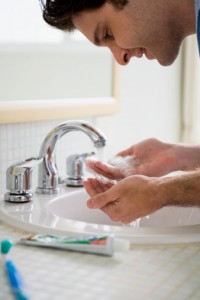Four ideas to help protect your health and your plumbing.
 As Americans we are fortunate to live in a country where by and large everyone has access to clean drinking water. However, that doesn’t mean that everyone’s home water quality is equal or ideal. If you are not satisfied with the taste or quality of your water, consider whether one of these 4 upgrades could help.
As Americans we are fortunate to live in a country where by and large everyone has access to clean drinking water. However, that doesn’t mean that everyone’s home water quality is equal or ideal. If you are not satisfied with the taste or quality of your water, consider whether one of these 4 upgrades could help.
Install a Water Filtration System
Depending on where your water comes from, it could have natural mineral flavors already in it, or it could be picking up unpleasant flavors from the pipes it travels through en route to your tap. Either way, installing a water filter can help improve the taste and quality of your water. Options include filters that mount directly over a faucet or fit under your sink for point-of-use purifying, as well larger systems designed to treat all your water using reverse osmosis.
Replace Old Pipes
If you have old, rusty pipes in your home, you will definitely see this reflected in water quality issues at some time or another. You might be able to actually see the discoloration in the water when you first turn on a tap after a period of disuse, or you might just notice a funny taste to the water or red-brown stains in your plumbing fixtures. If you have old lead pipes the situation will be even more serious because you could be exposed to risk of lead poisoning. In any case, replacing or relining your pipes will prevent water from picking up contaminants to improve its taste and appearance.
Install a Water Softener
If your water has high mineral content, this can affect the effectiveness of soaps and detergents, create bad tastes, and even corrode or clog your pipes over time. In order to adjust the chemistry of your water to a more normal level, you will need to invest in a water softener.
Get Your Well Water Tested
If you depend on a private well for your water supply, there’s no one looking out for your water quality but you. This means you need to take initiative to get regular water testing to ensure a safe and clean supply of water. Experts recommend getting bacteriological testing to check for contaminants that result from cross contamination with fecal matter or sewage systems every 3 to 6 months. Chemical testing to check for heavy metals that could be hazardous to your health and pH issues that could harm your pipes is recommended every few years.








